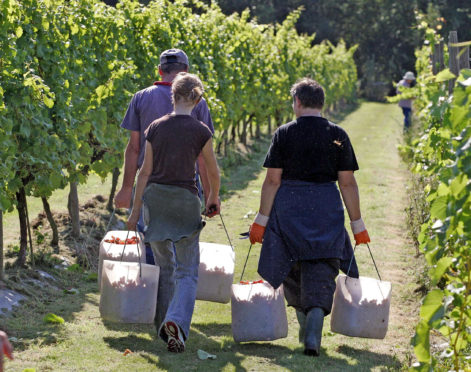
Scotland’s crops will rot in the fields unless farmers are able to recruit an army of pickers from Eastern Europe, industry leaders warn.
Berry farmer James Porter said that despite having thousands of applications from people across the UK, they now believe they will still need a “hard core of experienced pickers” from Eastern Europe to save the fruit.
He said: “Our job search has brought over 2,500 applicants from all over the UK, but that is still not enough to pick Scotland’s berry crop.
“We need around 10,000 pickers every year, and that means we will still need a hard core of experienced pickers from Eastern Europe to come and help us. Otherwise our crops will rot in the fields.”
Fruit farmers had appealed for volunteer workers to leave towns and cities for three months to pick crops.
Mr Porter, of Angus Growers, which is owned by 19 separate farms in Angus, Perthshire and Fife, said: “We’ve been overwhelmed by the number of UK applicants. But we have to be realistic about this. It takes around three weeks to train a picker to do the job properly.
“Berry picking has to be done in season, and we’re very much aware that as soon as lockdown ends many of those who applied will want to go back to their usual employment, which will give us a problem if we don’t have a core of workers we can rely on through till September.
“That is why we’re still pushing to get some overseas workers, we’ve relied on them for years to bring in our crops. I reckon I’ll need at least 200 on my farm. Other growers will be the same, so we will still need several thousand overseas pickers for Scotland’s berry harvest.”
Last week, a charter flight of 147 Romanian workers landed at Stansted Airport as part of a push by the farming industry to ease the chronic shortage of seasonal labour in England.
Mr Porter said: “We’re watching what’s happening in England with the pickers brought over from Eastern Europe, and hoping we will be able to bring people in too, as long as it’s safe and practicable.”
Mr Porter, 48, the third generation of his family to farm at East Scryne at Easthaven, near Carnoustie, said: “The livelihood of generations of farmers is at stake.
“We need to do everything possible to attract pickers from next month until September and are hoping the government supports us to keep our industry alive.”
East Scryne produces 1,000 tons of strawberries, 80 tons of blueberries and 40 tons of blackberries each year, sold to supermarkets across the UK.
Scottish farmers supply Scottish food and drink producers, generating £15 billion to the economy.
The National Farmers’ Union (NFU) Scotland is in talks with the UK Government ministers about bringing in large numbers of migrant workers.
The EU Commission has issued guidelines on allowing the movement of migrant agricultural workers, and the NFU wants these to apply in the UK.
But it’s not just fruit growers who are suffering. Pig farming is worth £262m of Scotland’s £1.5bn livestock market and one of the country’s biggest pork producers, Jamie Wyllie, of Ruchlaw Farm in Dunbar, is hoping people will consider taking a break from the lockdown to help muck out the animals if he runs out of farmhands due to self-isolation or illness.
He said: “We’re hoping to hark back in time to the Second World War when we had a land army fighting to keep the country fed while the military fought on the front line.”
Mr Wyllie said: “We need protective equipment to tend to the animals hygienically, and stocks are getting low. You can’t stop piglets or lambs being born and we’re right in the middle of the season.
“We have 30,000 pigs and 1,200 ewes and a £7m-a-year turnover to maintain with high costs. We’re coming up for the peak lamb time but, with live markets and auctions closed down, sales are flattened.”
Scotland’s cereal and horticultural crops are worth more than £1bn. Willie Thomson, 48, who farms Wheatrig near Haddington, is questioning whether to plant wheat and barley crops as the virus lockdown continues to leave commercial alcohol sales in doubt.
Mr Thomson said: “We’re supposed to be ready to plant for harvesting in the autumn. But if the pubs, distilleries and breweries are still in lockdown, will they still want to buy our crops?
“We harvest about 1,000 tons of barley for Scotland’s £4bn whisky industry and about 1,500 tons of wheat for breweries over our 1,200 acres.”
Andrew McCornick, National Farmers’ Union chairman for Scotland, said the public was beginning to appreciate the industry’s importance.
He said: “We’re trying our very best to keep going and feed the nation because this business is in our blood.
“Things have changed rapidly and it’s clear the businesses we rely on, such as packaging and distribution, are struggling to keep up so we can get our produce out to the public.”
The Scottish Government said: “We continue to liaise closely with farmers and crofters and agricultural support businesses throughout this crisis to monitor impacts on food production.
“We would also encourage those workers in the hospitality sector who have been displaced by the effects of Covid-19 to consider working in the fruit and vegetable growing sector as an option.”

Enjoy the convenience of having The Sunday Post delivered as a digital ePaper straight to your smartphone, tablet or computer.
Subscribe for only £5.49 a month and enjoy all the benefits of the printed paper as a digital replica.
Subscribe